COU104A - Applied Counselling: Role of Basic Skills in Effective Help
VerifiedAdded on 2023/06/18
|7
|1839
|160
Essay
AI Summary
This essay discusses the significance of various micro-skills in ensuring effective counselling sessions. It highlights the importance of building a strong client-counsellor relationship through empathy and trust. Key skills explored include active listening, reflective practice (content and feelings), clarifying questions, and utilizing open-ended questions to gain deeper understanding. The essay emphasizes that the proper application of these skills is crucial for accurate problem identification, goal setting, and ultimately, providing clients with appropriate solutions and fostering positive change. The effective integration of communication, analytical, and listening skills contributes to successful counselling outcomes and client satisfaction.
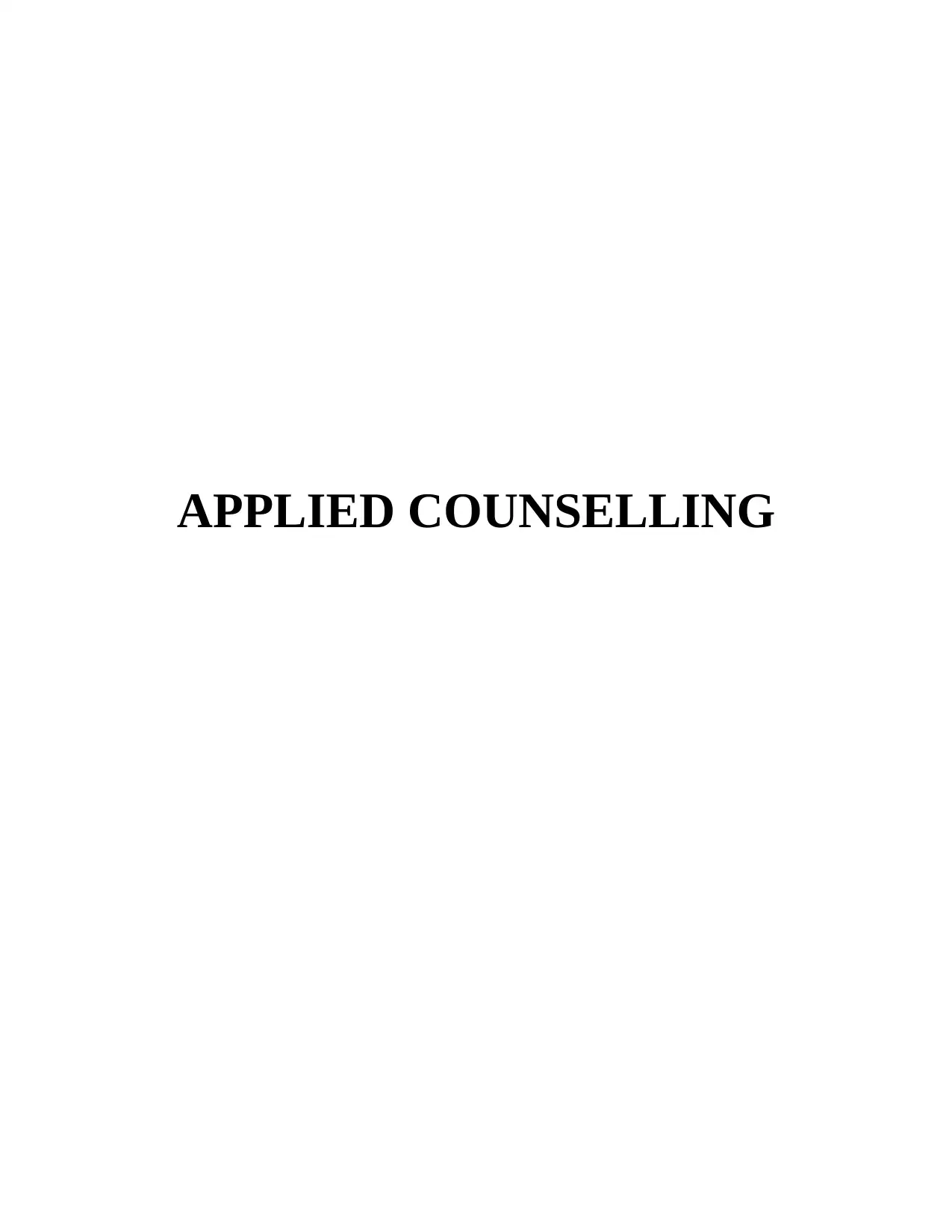
APPLIED COUNSELLING
Paraphrase This Document
Need a fresh take? Get an instant paraphrase of this document with our AI Paraphraser

TABLE OF CONTENTS
MAIN BODY...................................................................................................................................1
REFERENCES................................................................................................................................5
MAIN BODY...................................................................................................................................1
REFERENCES................................................................................................................................5
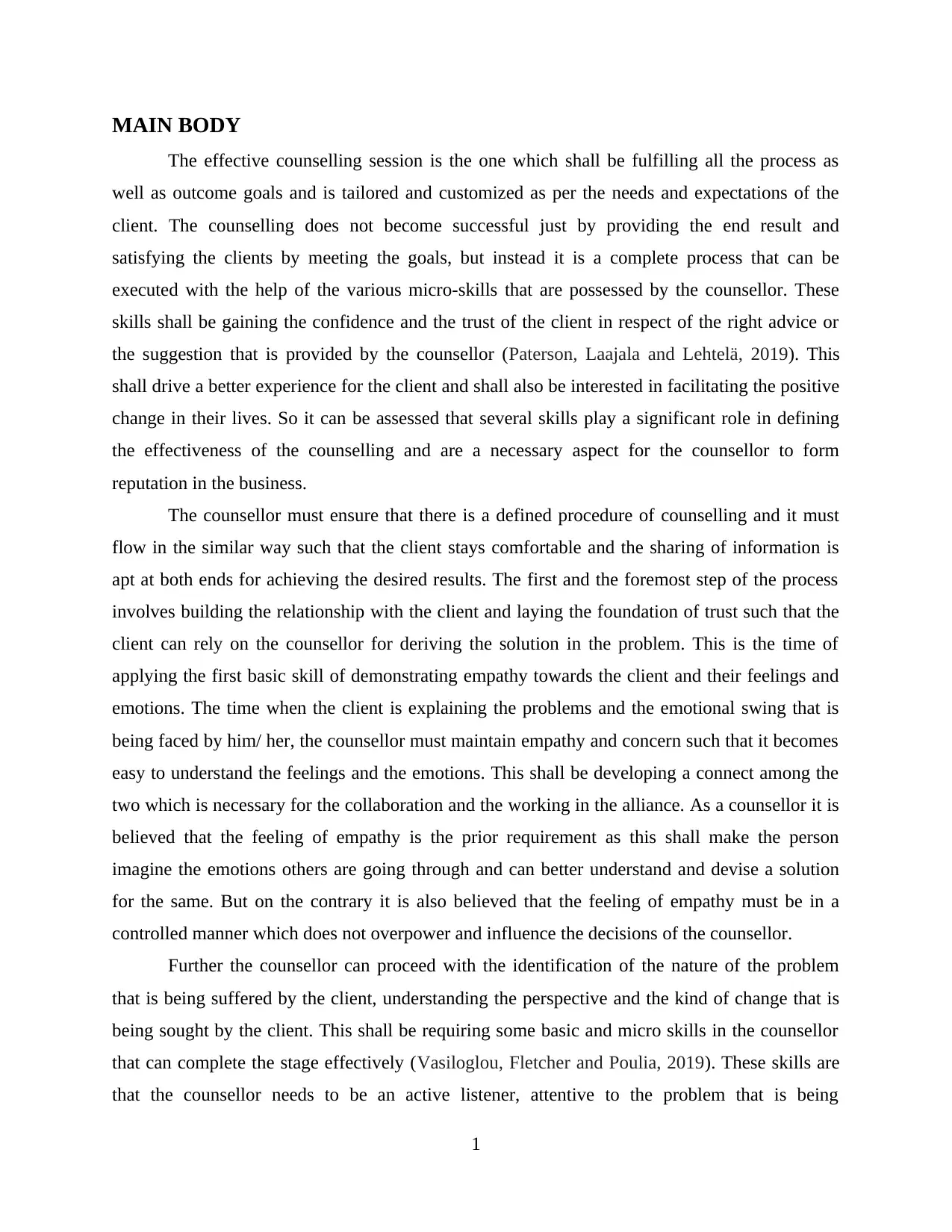
MAIN BODY
The effective counselling session is the one which shall be fulfilling all the process as
well as outcome goals and is tailored and customized as per the needs and expectations of the
client. The counselling does not become successful just by providing the end result and
satisfying the clients by meeting the goals, but instead it is a complete process that can be
executed with the help of the various micro-skills that are possessed by the counsellor. These
skills shall be gaining the confidence and the trust of the client in respect of the right advice or
the suggestion that is provided by the counsellor (Paterson, Laajala and Lehtelä, 2019). This
shall drive a better experience for the client and shall also be interested in facilitating the positive
change in their lives. So it can be assessed that several skills play a significant role in defining
the effectiveness of the counselling and are a necessary aspect for the counsellor to form
reputation in the business.
The counsellor must ensure that there is a defined procedure of counselling and it must
flow in the similar way such that the client stays comfortable and the sharing of information is
apt at both ends for achieving the desired results. The first and the foremost step of the process
involves building the relationship with the client and laying the foundation of trust such that the
client can rely on the counsellor for deriving the solution in the problem. This is the time of
applying the first basic skill of demonstrating empathy towards the client and their feelings and
emotions. The time when the client is explaining the problems and the emotional swing that is
being faced by him/ her, the counsellor must maintain empathy and concern such that it becomes
easy to understand the feelings and the emotions. This shall be developing a connect among the
two which is necessary for the collaboration and the working in the alliance. As a counsellor it is
believed that the feeling of empathy is the prior requirement as this shall make the person
imagine the emotions others are going through and can better understand and devise a solution
for the same. But on the contrary it is also believed that the feeling of empathy must be in a
controlled manner which does not overpower and influence the decisions of the counsellor.
Further the counsellor can proceed with the identification of the nature of the problem
that is being suffered by the client, understanding the perspective and the kind of change that is
being sought by the client. This shall be requiring some basic and micro skills in the counsellor
that can complete the stage effectively (Vasiloglou, Fletcher and Poulia, 2019). These skills are
that the counsellor needs to be an active listener, attentive to the problem that is being
1
The effective counselling session is the one which shall be fulfilling all the process as
well as outcome goals and is tailored and customized as per the needs and expectations of the
client. The counselling does not become successful just by providing the end result and
satisfying the clients by meeting the goals, but instead it is a complete process that can be
executed with the help of the various micro-skills that are possessed by the counsellor. These
skills shall be gaining the confidence and the trust of the client in respect of the right advice or
the suggestion that is provided by the counsellor (Paterson, Laajala and Lehtelä, 2019). This
shall drive a better experience for the client and shall also be interested in facilitating the positive
change in their lives. So it can be assessed that several skills play a significant role in defining
the effectiveness of the counselling and are a necessary aspect for the counsellor to form
reputation in the business.
The counsellor must ensure that there is a defined procedure of counselling and it must
flow in the similar way such that the client stays comfortable and the sharing of information is
apt at both ends for achieving the desired results. The first and the foremost step of the process
involves building the relationship with the client and laying the foundation of trust such that the
client can rely on the counsellor for deriving the solution in the problem. This is the time of
applying the first basic skill of demonstrating empathy towards the client and their feelings and
emotions. The time when the client is explaining the problems and the emotional swing that is
being faced by him/ her, the counsellor must maintain empathy and concern such that it becomes
easy to understand the feelings and the emotions. This shall be developing a connect among the
two which is necessary for the collaboration and the working in the alliance. As a counsellor it is
believed that the feeling of empathy is the prior requirement as this shall make the person
imagine the emotions others are going through and can better understand and devise a solution
for the same. But on the contrary it is also believed that the feeling of empathy must be in a
controlled manner which does not overpower and influence the decisions of the counsellor.
Further the counsellor can proceed with the identification of the nature of the problem
that is being suffered by the client, understanding the perspective and the kind of change that is
being sought by the client. This shall be requiring some basic and micro skills in the counsellor
that can complete the stage effectively (Vasiloglou, Fletcher and Poulia, 2019). These skills are
that the counsellor needs to be an active listener, attentive to the problem that is being
1
⊘ This is a preview!⊘
Do you want full access?
Subscribe today to unlock all pages.

Trusted by 1+ million students worldwide
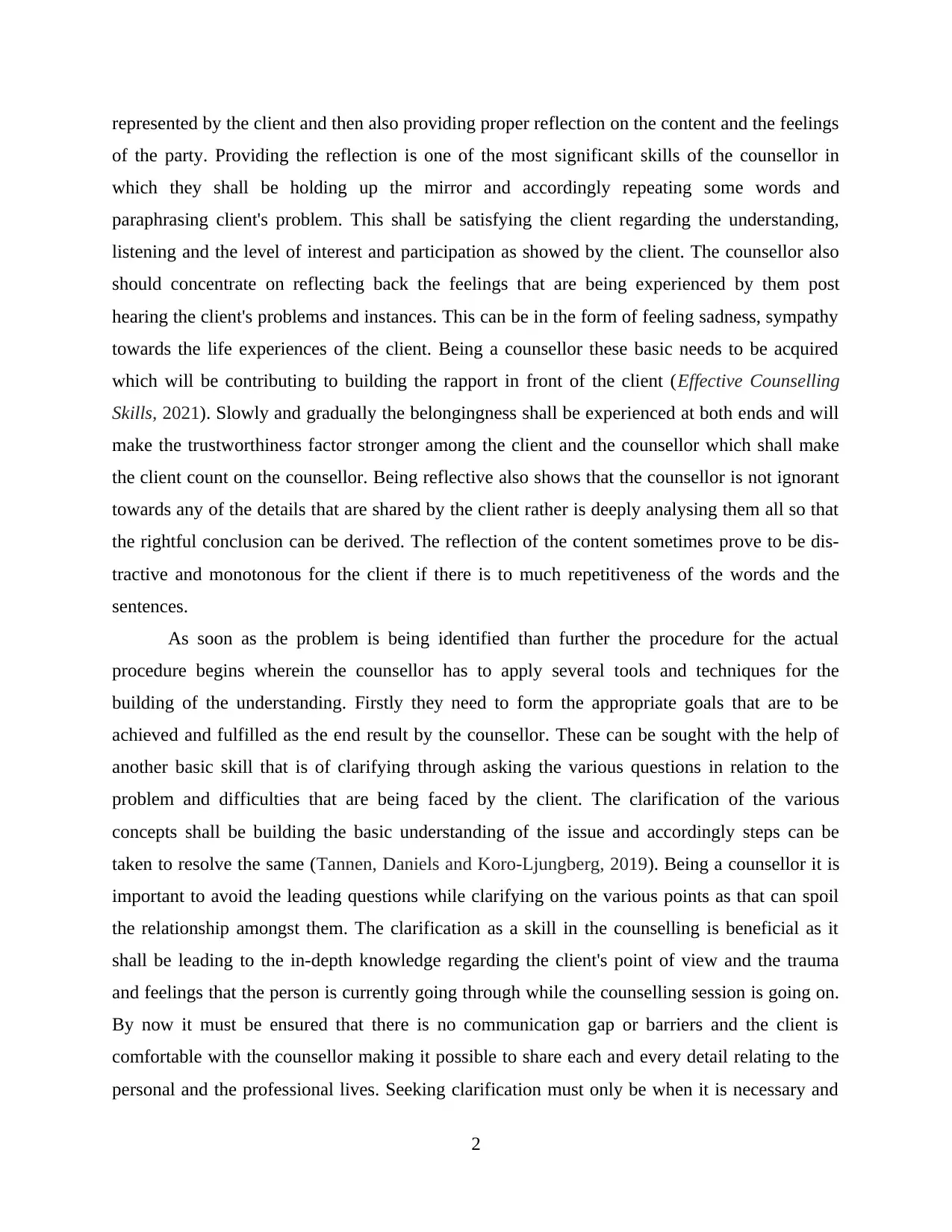
represented by the client and then also providing proper reflection on the content and the feelings
of the party. Providing the reflection is one of the most significant skills of the counsellor in
which they shall be holding up the mirror and accordingly repeating some words and
paraphrasing client's problem. This shall be satisfying the client regarding the understanding,
listening and the level of interest and participation as showed by the client. The counsellor also
should concentrate on reflecting back the feelings that are being experienced by them post
hearing the client's problems and instances. This can be in the form of feeling sadness, sympathy
towards the life experiences of the client. Being a counsellor these basic needs to be acquired
which will be contributing to building the rapport in front of the client (Effective Counselling
Skills, 2021). Slowly and gradually the belongingness shall be experienced at both ends and will
make the trustworthiness factor stronger among the client and the counsellor which shall make
the client count on the counsellor. Being reflective also shows that the counsellor is not ignorant
towards any of the details that are shared by the client rather is deeply analysing them all so that
the rightful conclusion can be derived. The reflection of the content sometimes prove to be dis-
tractive and monotonous for the client if there is to much repetitiveness of the words and the
sentences.
As soon as the problem is being identified than further the procedure for the actual
procedure begins wherein the counsellor has to apply several tools and techniques for the
building of the understanding. Firstly they need to form the appropriate goals that are to be
achieved and fulfilled as the end result by the counsellor. These can be sought with the help of
another basic skill that is of clarifying through asking the various questions in relation to the
problem and difficulties that are being faced by the client. The clarification of the various
concepts shall be building the basic understanding of the issue and accordingly steps can be
taken to resolve the same (Tannen, Daniels and Koro-Ljungberg, 2019). Being a counsellor it is
important to avoid the leading questions while clarifying on the various points as that can spoil
the relationship amongst them. The clarification as a skill in the counselling is beneficial as it
shall be leading to the in-depth knowledge regarding the client's point of view and the trauma
and feelings that the person is currently going through while the counselling session is going on.
By now it must be ensured that there is no communication gap or barriers and the client is
comfortable with the counsellor making it possible to share each and every detail relating to the
personal and the professional lives. Seeking clarification must only be when it is necessary and
2
of the party. Providing the reflection is one of the most significant skills of the counsellor in
which they shall be holding up the mirror and accordingly repeating some words and
paraphrasing client's problem. This shall be satisfying the client regarding the understanding,
listening and the level of interest and participation as showed by the client. The counsellor also
should concentrate on reflecting back the feelings that are being experienced by them post
hearing the client's problems and instances. This can be in the form of feeling sadness, sympathy
towards the life experiences of the client. Being a counsellor these basic needs to be acquired
which will be contributing to building the rapport in front of the client (Effective Counselling
Skills, 2021). Slowly and gradually the belongingness shall be experienced at both ends and will
make the trustworthiness factor stronger among the client and the counsellor which shall make
the client count on the counsellor. Being reflective also shows that the counsellor is not ignorant
towards any of the details that are shared by the client rather is deeply analysing them all so that
the rightful conclusion can be derived. The reflection of the content sometimes prove to be dis-
tractive and monotonous for the client if there is to much repetitiveness of the words and the
sentences.
As soon as the problem is being identified than further the procedure for the actual
procedure begins wherein the counsellor has to apply several tools and techniques for the
building of the understanding. Firstly they need to form the appropriate goals that are to be
achieved and fulfilled as the end result by the counsellor. These can be sought with the help of
another basic skill that is of clarifying through asking the various questions in relation to the
problem and difficulties that are being faced by the client. The clarification of the various
concepts shall be building the basic understanding of the issue and accordingly steps can be
taken to resolve the same (Tannen, Daniels and Koro-Ljungberg, 2019). Being a counsellor it is
important to avoid the leading questions while clarifying on the various points as that can spoil
the relationship amongst them. The clarification as a skill in the counselling is beneficial as it
shall be leading to the in-depth knowledge regarding the client's point of view and the trauma
and feelings that the person is currently going through while the counselling session is going on.
By now it must be ensured that there is no communication gap or barriers and the client is
comfortable with the counsellor making it possible to share each and every detail relating to the
personal and the professional lives. Seeking clarification must only be when it is necessary and
2
Paraphrase This Document
Need a fresh take? Get an instant paraphrase of this document with our AI Paraphraser
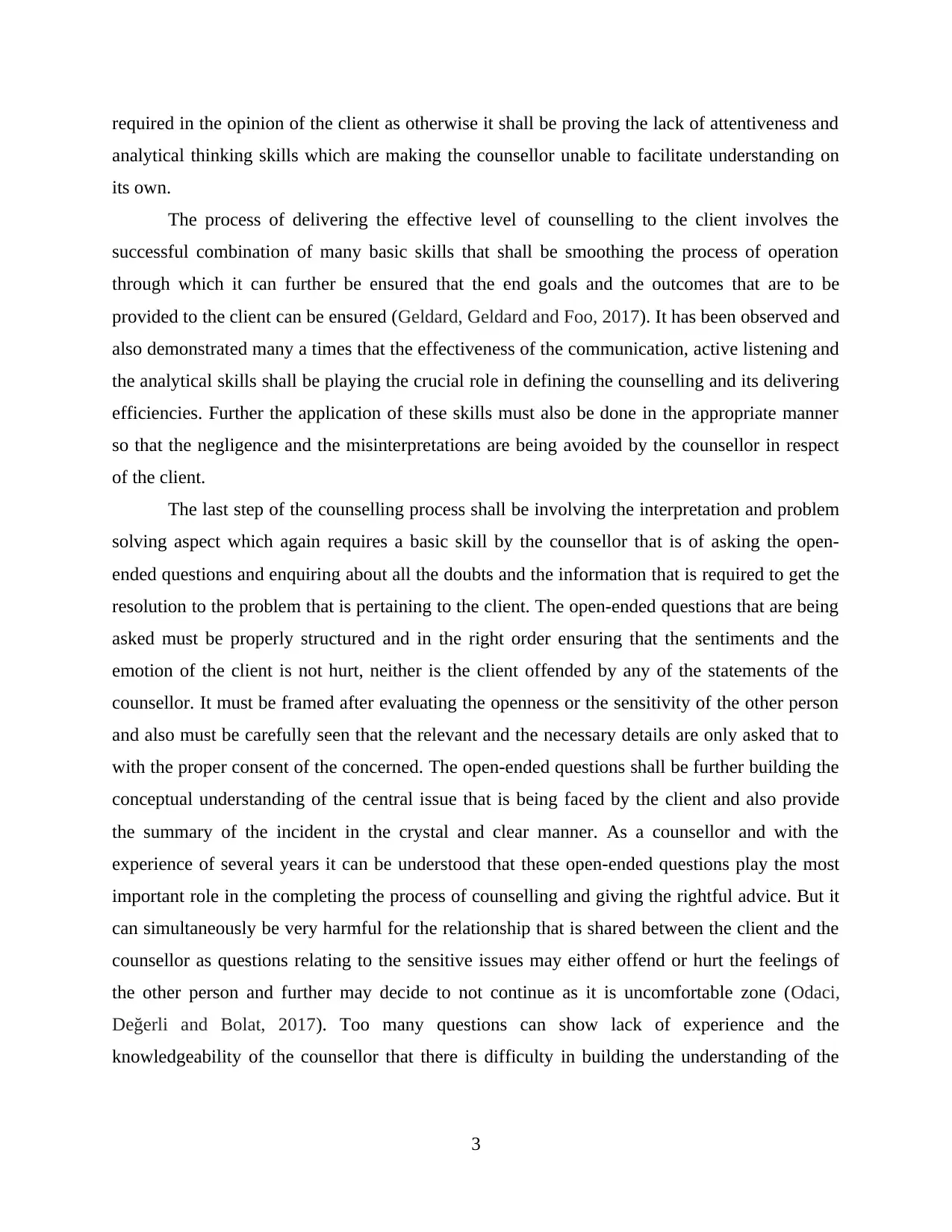
required in the opinion of the client as otherwise it shall be proving the lack of attentiveness and
analytical thinking skills which are making the counsellor unable to facilitate understanding on
its own.
The process of delivering the effective level of counselling to the client involves the
successful combination of many basic skills that shall be smoothing the process of operation
through which it can further be ensured that the end goals and the outcomes that are to be
provided to the client can be ensured (Geldard, Geldard and Foo, 2017). It has been observed and
also demonstrated many a times that the effectiveness of the communication, active listening and
the analytical skills shall be playing the crucial role in defining the counselling and its delivering
efficiencies. Further the application of these skills must also be done in the appropriate manner
so that the negligence and the misinterpretations are being avoided by the counsellor in respect
of the client.
The last step of the counselling process shall be involving the interpretation and problem
solving aspect which again requires a basic skill by the counsellor that is of asking the open-
ended questions and enquiring about all the doubts and the information that is required to get the
resolution to the problem that is pertaining to the client. The open-ended questions that are being
asked must be properly structured and in the right order ensuring that the sentiments and the
emotion of the client is not hurt, neither is the client offended by any of the statements of the
counsellor. It must be framed after evaluating the openness or the sensitivity of the other person
and also must be carefully seen that the relevant and the necessary details are only asked that to
with the proper consent of the concerned. The open-ended questions shall be further building the
conceptual understanding of the central issue that is being faced by the client and also provide
the summary of the incident in the crystal and clear manner. As a counsellor and with the
experience of several years it can be understood that these open-ended questions play the most
important role in the completing the process of counselling and giving the rightful advice. But it
can simultaneously be very harmful for the relationship that is shared between the client and the
counsellor as questions relating to the sensitive issues may either offend or hurt the feelings of
the other person and further may decide to not continue as it is uncomfortable zone (Odaci,
Değerli and Bolat, 2017). Too many questions can show lack of experience and the
knowledgeability of the counsellor that there is difficulty in building the understanding of the
3
analytical thinking skills which are making the counsellor unable to facilitate understanding on
its own.
The process of delivering the effective level of counselling to the client involves the
successful combination of many basic skills that shall be smoothing the process of operation
through which it can further be ensured that the end goals and the outcomes that are to be
provided to the client can be ensured (Geldard, Geldard and Foo, 2017). It has been observed and
also demonstrated many a times that the effectiveness of the communication, active listening and
the analytical skills shall be playing the crucial role in defining the counselling and its delivering
efficiencies. Further the application of these skills must also be done in the appropriate manner
so that the negligence and the misinterpretations are being avoided by the counsellor in respect
of the client.
The last step of the counselling process shall be involving the interpretation and problem
solving aspect which again requires a basic skill by the counsellor that is of asking the open-
ended questions and enquiring about all the doubts and the information that is required to get the
resolution to the problem that is pertaining to the client. The open-ended questions that are being
asked must be properly structured and in the right order ensuring that the sentiments and the
emotion of the client is not hurt, neither is the client offended by any of the statements of the
counsellor. It must be framed after evaluating the openness or the sensitivity of the other person
and also must be carefully seen that the relevant and the necessary details are only asked that to
with the proper consent of the concerned. The open-ended questions shall be further building the
conceptual understanding of the central issue that is being faced by the client and also provide
the summary of the incident in the crystal and clear manner. As a counsellor and with the
experience of several years it can be understood that these open-ended questions play the most
important role in the completing the process of counselling and giving the rightful advice. But it
can simultaneously be very harmful for the relationship that is shared between the client and the
counsellor as questions relating to the sensitive issues may either offend or hurt the feelings of
the other person and further may decide to not continue as it is uncomfortable zone (Odaci,
Değerli and Bolat, 2017). Too many questions can show lack of experience and the
knowledgeability of the counsellor that there is difficulty in building the understanding of the
3
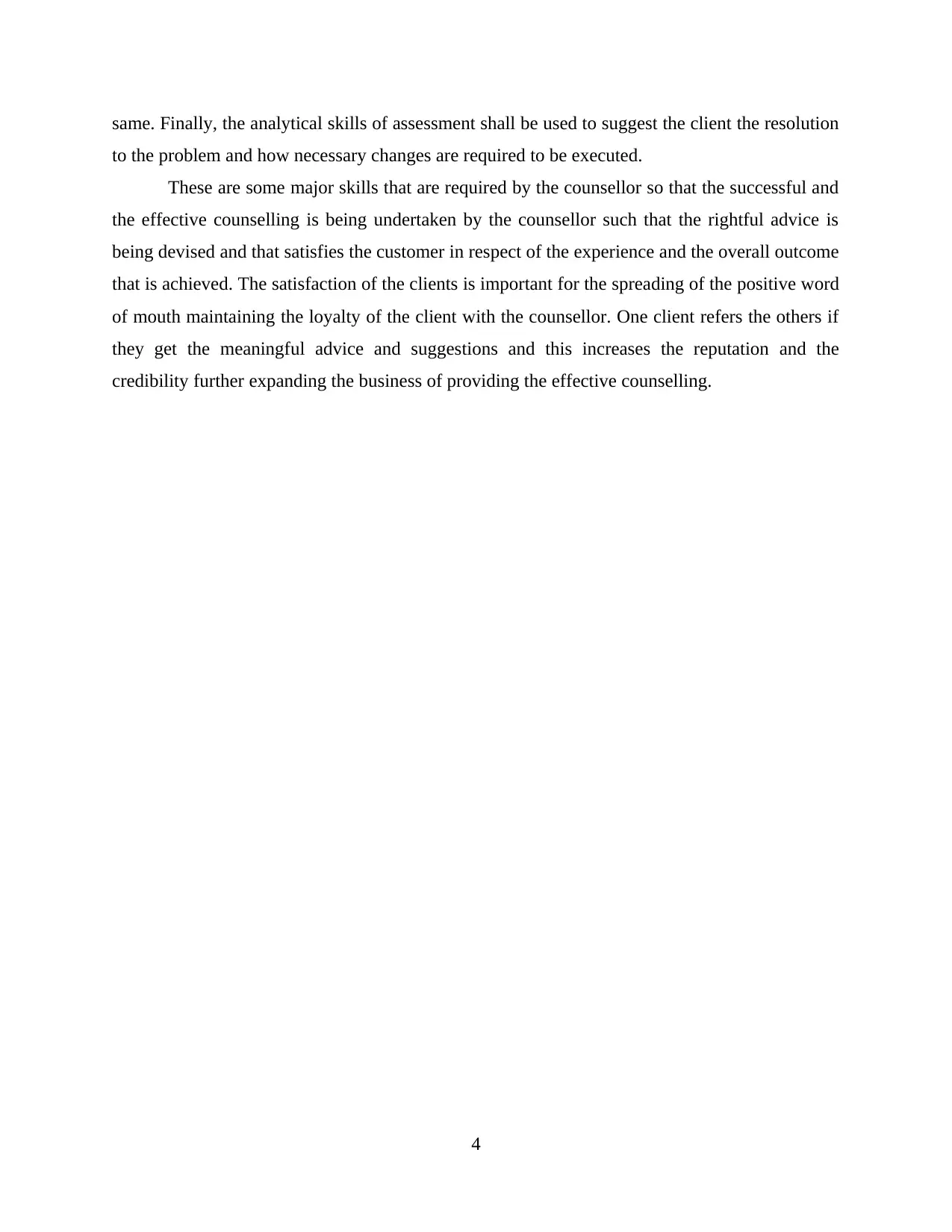
same. Finally, the analytical skills of assessment shall be used to suggest the client the resolution
to the problem and how necessary changes are required to be executed.
These are some major skills that are required by the counsellor so that the successful and
the effective counselling is being undertaken by the counsellor such that the rightful advice is
being devised and that satisfies the customer in respect of the experience and the overall outcome
that is achieved. The satisfaction of the clients is important for the spreading of the positive word
of mouth maintaining the loyalty of the client with the counsellor. One client refers the others if
they get the meaningful advice and suggestions and this increases the reputation and the
credibility further expanding the business of providing the effective counselling.
4
to the problem and how necessary changes are required to be executed.
These are some major skills that are required by the counsellor so that the successful and
the effective counselling is being undertaken by the counsellor such that the rightful advice is
being devised and that satisfies the customer in respect of the experience and the overall outcome
that is achieved. The satisfaction of the clients is important for the spreading of the positive word
of mouth maintaining the loyalty of the client with the counsellor. One client refers the others if
they get the meaningful advice and suggestions and this increases the reputation and the
credibility further expanding the business of providing the effective counselling.
4
⊘ This is a preview!⊘
Do you want full access?
Subscribe today to unlock all pages.

Trusted by 1+ million students worldwide
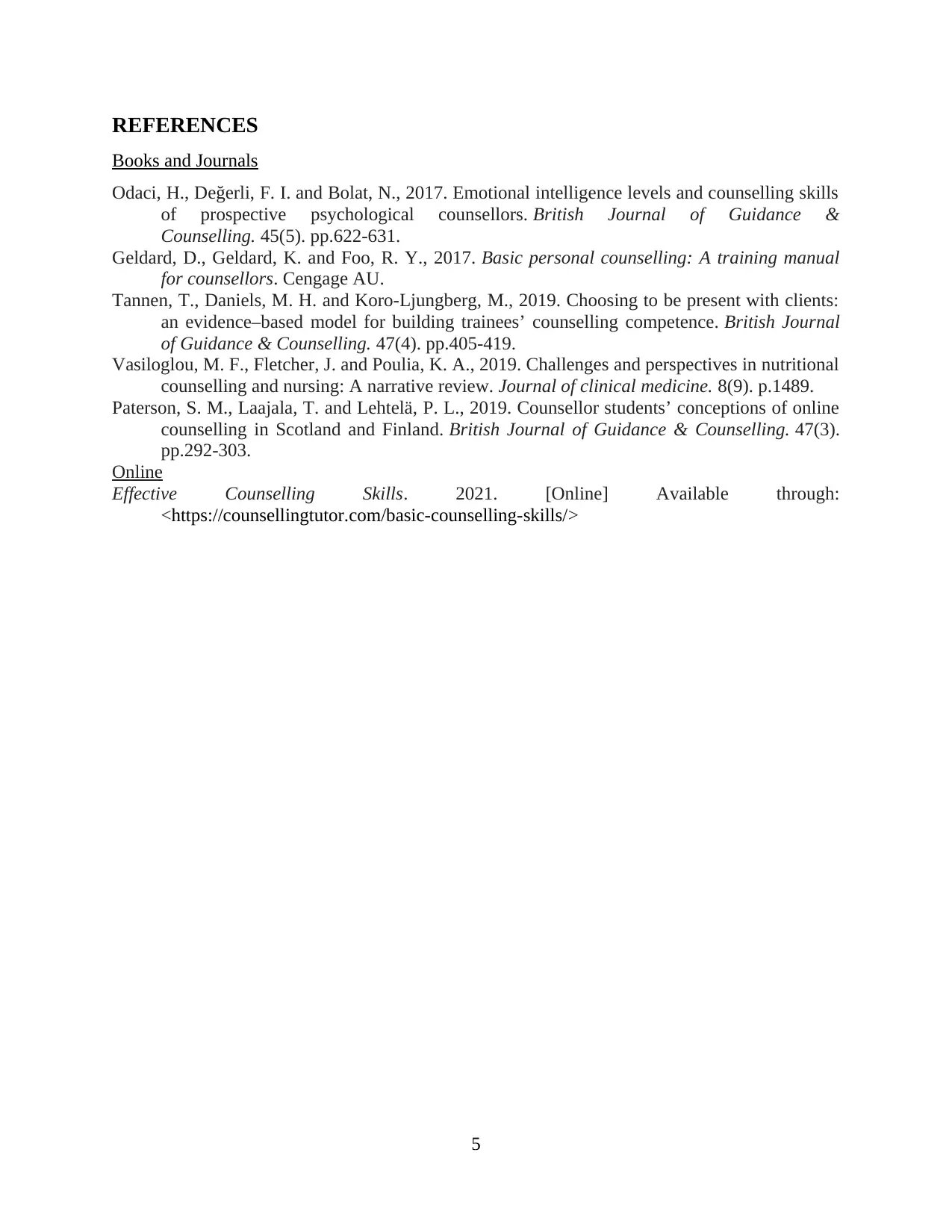
REFERENCES
Books and Journals
Odaci, H., Değerli, F. I. and Bolat, N., 2017. Emotional intelligence levels and counselling skills
of prospective psychological counsellors. British Journal of Guidance &
Counselling. 45(5). pp.622-631.
Geldard, D., Geldard, K. and Foo, R. Y., 2017. Basic personal counselling: A training manual
for counsellors. Cengage AU.
Tannen, T., Daniels, M. H. and Koro-Ljungberg, M., 2019. Choosing to be present with clients:
an evidence–based model for building trainees’ counselling competence. British Journal
of Guidance & Counselling. 47(4). pp.405-419.
Vasiloglou, M. F., Fletcher, J. and Poulia, K. A., 2019. Challenges and perspectives in nutritional
counselling and nursing: A narrative review. Journal of clinical medicine. 8(9). p.1489.
Paterson, S. M., Laajala, T. and Lehtelä, P. L., 2019. Counsellor students’ conceptions of online
counselling in Scotland and Finland. British Journal of Guidance & Counselling. 47(3).
pp.292-303.
Online
Effective Counselling Skills. 2021. [Online] Available through:
<https://counsellingtutor.com/basic-counselling-skills/>
5
Books and Journals
Odaci, H., Değerli, F. I. and Bolat, N., 2017. Emotional intelligence levels and counselling skills
of prospective psychological counsellors. British Journal of Guidance &
Counselling. 45(5). pp.622-631.
Geldard, D., Geldard, K. and Foo, R. Y., 2017. Basic personal counselling: A training manual
for counsellors. Cengage AU.
Tannen, T., Daniels, M. H. and Koro-Ljungberg, M., 2019. Choosing to be present with clients:
an evidence–based model for building trainees’ counselling competence. British Journal
of Guidance & Counselling. 47(4). pp.405-419.
Vasiloglou, M. F., Fletcher, J. and Poulia, K. A., 2019. Challenges and perspectives in nutritional
counselling and nursing: A narrative review. Journal of clinical medicine. 8(9). p.1489.
Paterson, S. M., Laajala, T. and Lehtelä, P. L., 2019. Counsellor students’ conceptions of online
counselling in Scotland and Finland. British Journal of Guidance & Counselling. 47(3).
pp.292-303.
Online
Effective Counselling Skills. 2021. [Online] Available through:
<https://counsellingtutor.com/basic-counselling-skills/>
5
1 out of 7
Related Documents
Your All-in-One AI-Powered Toolkit for Academic Success.
+13062052269
info@desklib.com
Available 24*7 on WhatsApp / Email
![[object Object]](/_next/static/media/star-bottom.7253800d.svg)
Unlock your academic potential
Copyright © 2020–2026 A2Z Services. All Rights Reserved. Developed and managed by ZUCOL.





